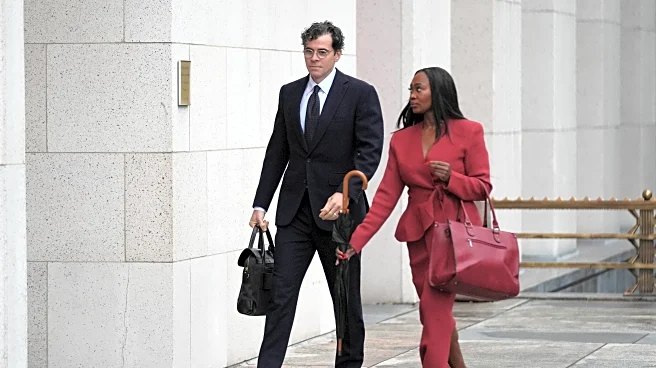What's Happening?
South Korea's Supreme Court has overturned a previous ruling that required Chey Tae-won, chairman of the SK Group, to pay his ex-wife Roh So-young a settlement of 1.38 trillion won ($1 billion). The decision was based on a miscalculation of the couple's
assets, which included a 30 billion won slush fund linked to Roh's father, former president Roh Tae-woo. The court determined that the fund originated from bribes and could not be considered part of the couple's joint assets. The case, known as the 'divorce of the century,' has captivated South Korea due to the high-profile nature of the individuals involved. Despite the overturning of the settlement, the Supreme Court upheld a 2 billion won alimony payment for Roh.
Why It's Important?
The Supreme Court's decision has significant implications for the SK Group, one of South Korea's largest conglomerates, as it alleviates immediate financial pressure on Chey Tae-won. The ruling may stabilize SK Group's operations in the short term, as Chey is not required to liquidate assets to meet the settlement. However, the ongoing legal battle could affect investor confidence, as evidenced by a 5.4% drop in SK's shares following the ruling. The case also highlights the intersection of business and politics in South Korea, given the involvement of a former president's family and the conglomerate's extensive influence across various sectors.
What's Next?
The Supreme Court's decision to review the case suggests that further legal proceedings are likely, potentially prolonging the dispute between Chey and Roh. This could lead to additional scrutiny of SK Group's financial practices and governance. Stakeholders, including investors and business partners, will be closely monitoring the situation for any signs of instability or changes in leadership within the conglomerate. The ruling may also prompt discussions on the legal treatment of assets linked to political figures in South Korea.
Beyond the Headlines
The case underscores the ethical and legal challenges associated with wealth and power in South Korea. It raises questions about the influence of political connections on business operations and the fairness of legal proceedings involving high-profile individuals. The Supreme Court's decision to exclude the slush fund from the couple's assets may set a precedent for future cases involving similar circumstances, potentially impacting how assets are evaluated in divorce settlements.

















